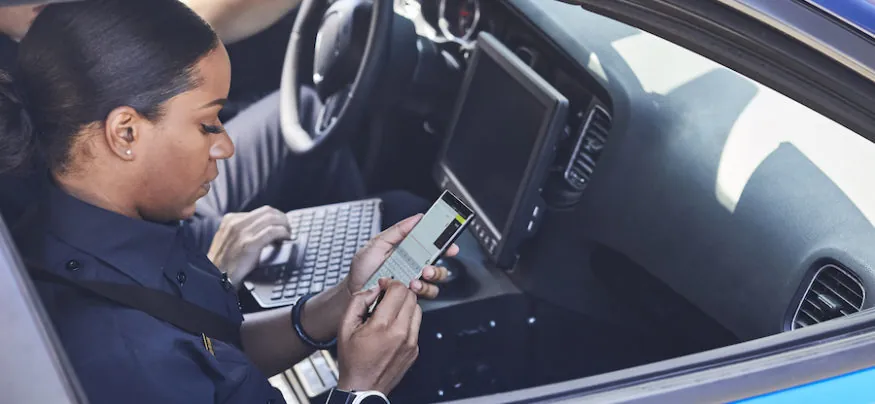In the age of digital dependency, our smartphones hold a vast trove of personal information – messages, photos, financial data, and more. So, when faced with a traffic stop in Illinois, a crucial question arises: can the police legally search your phone? The answer, unfortunately, is not as straightforward as a simple yes or no. This article delves into the complex legal landscape surrounding phone searches during traffic stops, examining the relevant Illinois law, recent court rulings, and your constitutional rights.
II. The Fourth Amendment and the Warrant Requirement
The Fourth Amendment to the U.S. Constitution safeguards citizens against unreasonable searches and seizures. This applies to physical objects like cars and bags, but also extends to digital information stored in devices like smartphones. Generally, police require a warrant to search such devices, which must be obtained from a judge after demonstrating probable cause, a reasonable belief that evidence of a crime will be found.
III. Exceptions to the Warrant Requirement:
While warrants are the norm, exceptions exist in certain situations. These include:
- Plain view: If the officer sees incriminating evidence on your phone screen while in plain view during the stop, they can seize the phone and use the evidence.
- Consent: You have the right to refuse a phone search, but you can also freely consent. However, consent must be freely given, without coercion or pressure.
- Exigent circumstances: In cases of immediate danger, where delay could lead to harm or destruction of evidence, officers may conduct warrantless searches.
- Inventory searches: If your car is impounded, officers can conduct an inventory search of its contents, including your phone, to document valuables for safekeeping. However, they cannot access the phone’s contents without a warrant or your consent.
IV. The Illinois Supreme Court Ruling and Its Implications:
In June 2023, the Illinois Supreme Court issued a controversial ruling in People v. Mays. The court held that police can compel defendants to unlock their phones with passcodes, even if they refuse consent. This ruling raised concerns about self-incrimination and privacy, as it essentially forces individuals to provide evidence against themselves. Legal scholars and privacy advocates argue that this ruling creates a dangerous precedent, potentially chilling free speech and expression.
V. Your Rights During a Traffic Stop:
Knowing your rights is crucial during a traffic stop. Here are some key points to remember:
- You have the right to remain silent and refuse to answer questions beyond basic identification.
- You have the right to refuse a phone search. Politely but firmly decline and state your desire for a lawyer if necessary.
- Do not give your phone passcode or fingerprint unless you freely consent.
- You can document the interaction with the officer, but avoid obstructing the stop or filming the officer directly.
VI. Seeking Legal Counsel:
If you face a situation where the police want to search your phone during a traffic stop, seeking legal counsel is highly advisable. An experienced attorney can advise you on your rights, help you navigate the legal complexities, and protect your privacy.
Sources:
- The ACLU of Illinois: https://www.aclu-il.org/en
- The Illinois State Bar Association: https://www.isba.org/
- The Illinois Attorney General’s Office: https://www.illinoisattorneygeneral.gov/
FAQ’s:
1. What if I’m stopped for a minor traffic violation, like a broken taillight? Does that change the officer’s right to search my phone?
Generally, minor traffic violations wouldn’t justify a warrantless phone search. However, the officer could request your consent or attempt to connect the violation to more serious suspicion (e.g., if you seem nervous or evasive). Remember, you have the right to refuse the search regardless of the reason for the stop.
2. Can the officer access my phone’s call history or contact list without a warrant?
Accessing this information typically requires a warrant, as it falls under your constitutional right to privacy. However, if the officer believes there’s an immediate threat to public safety, they might access this information without a warrant.
3. What happens if I unlock my phone out of fear or pressure from the officer? Does that waive my Fourth Amendment rights?
This situation is complex. Courts might view involuntary consent under pressure as invalid. Consulting with an attorney is crucial to understanding whether your Fourth Amendment rights have been violated in such cases.
4. Should I always keep my phone password-protected or use encryption?
While not mandatory, password protection and encryption are highly recommended practices to safeguard your phone’s content and complicate potential warrantless searches.
Conclusion:
The legal landscape surrounding phone searches during traffic stops in Illinois is constantly evolving. While the Fourth Amendment provides protections, exceptions exist, and recent court rulings raise new concerns. Understanding your rights, exercising them politely, and seeking legal counsel when necessary are crucial steps in safeguarding your privacy and ensuring fair treatment during law enforcement interactions.
Note: This article is for informational purposes only and should not be considered legal advice. Please consult with an attorney if you have specific questions about your rights.

